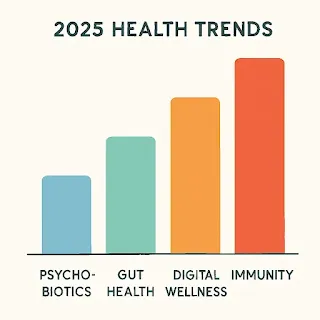Introduction: A New Era of Mental Health 🧬
In 2025, the way we approach mental health is evolving—and
it starts in your gut. The emerging science of psychobiotics is
shaking up traditional treatments by targeting the gut-brain axis, a
powerful communication highway between your digestive system and your brain.
If you've ever had "butterflies in your stomach"
or felt queasy under stress, you’ve experienced this connection firsthand. Now,
researchers are discovering that specific probiotics and prebiotics—dubbed
psychobiotics—can influence mood, cognition, and emotional balance 🌈.
Let’s dive into how these microscopic allies could
revolutionize mental wellness.
What Are Psychobiotics? 🧫
Psychobiotics are a class of live bacteria
(probiotics) and nutrients (prebiotics) that, when ingested, have a positive
effect on mental health. They work by:
- Modulating
the gut microbiota
- Reducing
inflammation
- Enhancing
neurotransmitter production (like serotonin and GABA)
- Improving
stress response and sleep quality
Common Psychobiotic Strains:
- Lactobacillus
rhamnosus (Reduces anxiety)
- Bifidobacterium
longum (Improves mood)
- Lactobacillus helveticus (Stress reduction)
The Gut-Brain Axis: Your Second Brain 🧠
The gut-brain axis is a two-way communication system
linking the gastrointestinal tract to the central nervous system. Here’s how it
works:
- The vagus
nerve transmits signals between gut and brain
- Gut
microbes produce neurotransmitters like serotonin
- A
healthy gut can reduce cortisol levels (your stress hormone)
🧠 Did you know? Over 90%
of serotonin—your feel-good neurotransmitter—is made in your gut!
Why Psychobiotics Matter in 2025 🌐
As mental health disorders skyrocket globally, many are
turning to holistic, non-pharmaceutical alternatives. Psychobiotics
offer a promising tool in this shift, aligning with current trends:
- 🌱
2025 Health Trends: Focus on microbiome health, digital
wellness tools, and natural therapies
- 🧘♂️
Rising interest in gut-mind balance and personalized nutrition
- 📉 Growing concerns over side effects of antidepressants and anti-anxiety meds
How to Incorporate Psychobiotics into Your Life 🍽️
Top Foods That Act as Natural Psychobiotics:
- Yogurt
(with live cultures)
- Kefir 🥛
- Sauerkraut
🥬
- Kimchi
🌶️
- Miso 🍜
- Bananas
& oats (prebiotic fiber)
Supplements to Consider:
- Look
for formulas with Lactobacillus and Bifidobacterium strains
- Choose
products with at least 10 billion CFU per serving
- Pair
with prebiotics for best results (inulin, GOS, FOS)
Lifestyle Tips for a Healthy Gut-Brain Axis:
- Manage
stress with mindfulness 🧘
- Get
enough sleep 😴
- Avoid
ultra-processed foods and added sugars
Top 10 Gut-Friendly Foods for Better Digestion
Backed by Science: What the Research Says 📚
- A 2022
meta-analysis in Frontiers in Psychiatry found psychobiotics
reduced depression symptoms significantly.
- Nature
Reviews Neuroscience (2023) linked gut bacteria diversity to emotional
resilience.
- Clinical
trials are ongoing for psychobiotics in PTSD, IBS, and chronic
fatigue syndrome.
https://www.ncbi.nlm.nih.gov/pmc/articles/PMC7071224/
Potential Risks & Considerations ⚠️
- Some
people may experience mild bloating or digestive discomfort.
- Always
consult a healthcare professional, especially if you’re on medication or
have immune issues.
- Not
all probiotics are psychobiotics—strain-specific benefits matter!
Final Thoughts: The Future is Microbial 🌎
As we learn more about the gut-brain connection, it's
becoming clear that caring for your microbiome is essential for both
physical and emotional well-being.
Psychobiotics aren't just a trend—they're a revolution
in how we understand mental health 🌿.
💡 Ready to upgrade your
wellness routine? Start with your gut.
FAQs: People Also Ask 🤔
Q1: Are psychobiotics safe for daily use?
Yes, most are safe when used as directed. Look for clinically-tested strains
and consult your doctor if unsure.
Q2: How long does it take for psychobiotics to work?
Results can vary, but many people report mood improvements within 2–4 weeks.
Q3: Can children take psychobiotics?
Some strains are safe for children, but consult a pediatrician for proper
guidance.
Q4: What’s the difference between probiotics and
psychobiotics?
All psychobiotics are probiotics, but not all probiotics have mental health
benefits.




Post a Comment